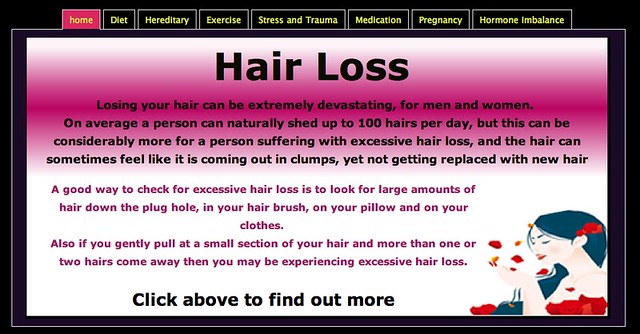If you have become aware that you are losing your hair, the problem could be related to a number of issues, such as hormones, stress, genetics or medications. The good news is that there are many resources available to help you reduce hair loss or conceal the signs of the loss of hair. This article will give you some useful tips to think about when coping with hair thinning.
Reducing the stress in your life, can really help to keep your hair from falling out, quite literally. Stress is a big contributor to hair loss, and for those that have trouble keeping stress controlled, thinning hair will continue. Discover ways to manage your stress.
Some hair products may not be good for your hair. Make a careful selection of any products that you will be applying to your hair, so that you avoid harmful ingredients. There are products that actually cause hair to grow more slowly. Be sure to make use of products that have been proven to be harmless.
Massaging your scalp on a regular basis can help to reduce hair thinning. Massaging your scalp will increase the circulation in your head by warming the skin and opening up the blood vessels. Rub in circular motions all over your scalp for at least 5 or 10 minutes every day. Rubbing your scalp can cut down stress, which causes thinning hair.
A wig might be a good temporary solution if you have hair loss. Choose your wig before losing all your hair, so you can select a color that matches your hair. When you buy a wig initially, you will be much more prepared for when you lose all your hair.
Wet Hair
When your hair is wet, never brush it! Wet hair can be very easy to damage. You can being brushing when your hair is at least fifty percent dry for best results. Brushing wet hair causes damage to your hair by making it frizzy and split, or it can completely pull it out.
If your hair is wet, don’t brush it. Instead, dry your hair with a soft towel and allow to air dry before you brush. Your follicles are fragile when wet and can get damaged easily. Brushing hair when wet can result in you losing it faster.
A side effect of some common anti-depressants that most people do not know about is the loss of hair. The ingredients in many of the anti-depressants cause hair thinning. If you are able, ask your doctor if it’s possible for you to switch medications, and see if the new medication stops the thinning hair.
Massaging your scalp often is a great way to prevent loss of hair and stimulate hair growth. For best results when you massage your scalp, use a mineral oil to lubricate and soften the skin.
Look into your past to find a reason for the loss of hair. Losing your hair could have something to do with a medicine you’re taking, or even something traumatic that has gone on in your life. Blading can only be stopped if you are able to successfully identify the underlying cause.
A vast majority of men will, at some point in there lives, experience thinning hair. You can lower the chances of substantial hair thinning if you realize how it works; DHT is released in your body from testosterone, and this hormone is known to actively seek out hair in an attempt to eradicate it.
Hair Thinning
After reading this article, you should be well prepared to deal with your hair thinning. By learning more about the possible causes and effects associated with the onset of hair thinning, you can find more constructive ways to live with thinning hair.
